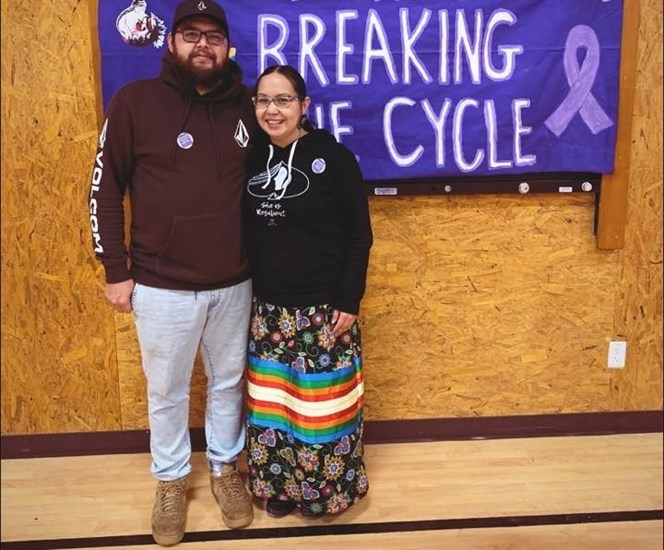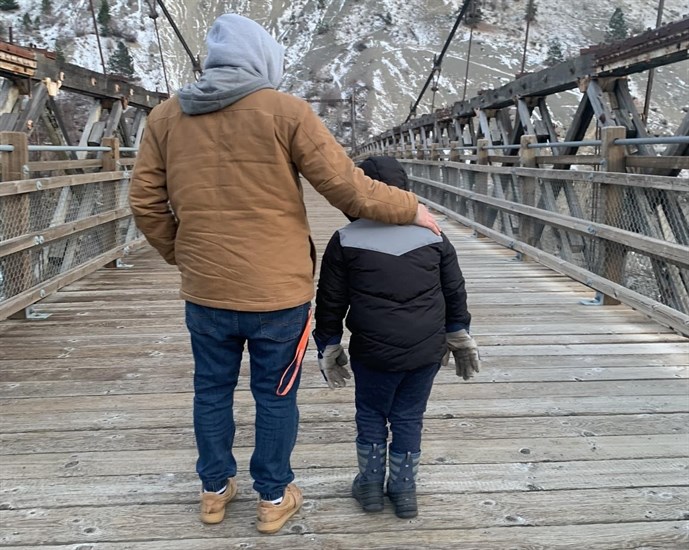
Rocker Brady (left) stands with his fiance Christine Shayla Mack at a forum called Breaking the Cycle in Lillooet in December, 2022.
Image Credit: SUBMITTED/ Rocker Brady
May 27, 2024 - 6:00 AM
Six years ago, Rocker Brady almost died after overdosing under the Overlanders Bridge in Kamloops in the middle of winter, just before dawn.
A stranger walking his dog in the area spotted Brady, used the naloxone in Brady’s backpack to revive him and called paramedics.
“I don’t know who the guy is, he saved my life,” Brady said. “I keep sharing my story in hopes he’ll remember me and step forward so I can thank him.”
That near-death experience on the cold night at the beginning of March 2018 would become a catalyst for Brady to reach out for help, go through a treatment program and start healing from the intergenerational trauma that haunted him.
Growing up in Lillooet, Brady’s parents separated when he was very young because of his dad’s drinking problem and violence. His dad was residential school survivor.
“He had trauma and coped by drinking and using (drugs). There was a point I was put into a safe haven shelter in Vancouver for a couple of weeks while my mom was in hiding from him, he was making attempts to take me in a state of heavy addiction.
“He ended up in and out of jail so I didn’t know him well growing up.”
When he was 16, Brady met his dad in person, but it wasn’t the reunion he was hoping it would be.
“He was just coming out of jail and I met him with my grandma. Tt wasn’t what I thought I’d get from him after all those years, he asked me for money. My dad was physically there but not emotionally.”
Brady had a lot of anger toward his dad and didn’t understand what his dad was going through until he did research on residential schools.
“I found more of an understanding of his actions. I was still really hurt, I’d never got to know him growing up,” he said. “I forgave him for all he did and we made a better connection.”
While he was growing up, Brady’s step dad was his father figure.
“It was a rough upbringing because of the way he was brought up, he passed that onto me and I got the belt or wooden spoon at times. They were drinking and partying a lot so I had to do stuff on my own, like teaching myself how to ride a bike and getting myself to school.”
Brady remembers times his parents were passed out from drinking and he would drink leftover alcohol but it wasn’t until high school that he started getting “blackout drunk.” He drank to cope with trauma and bullying, and to fit in.
“I was bullied because I had big ears so I grew my hair out all the time to try to cover them,” he said. “It gets hot in Lillooet, I never like having long hair but I couldn’t take the bullying. Drinking numbed that.”
READ MORE: Kamloops man designs innovative, award-winning housing model for addiction recovery
Brady dropped out of high school. He got into drugs and ended up homeless on the streets of Kamloops. He had a son and his mother took the boy into her care.
“Alcohol wasn’t a huge problem for me, I’d drink for days on end then go months without it, but once I got psychedelics and drugs, that was my problem, drugs were the issue. It took me overdosing to get my shit together.”
Brady lived on the streets for months with nothing but a backpack.
“I overdosed alone under a bridge at three in the morning in the middle of winter, a man spotted me and called paramedics. I came to with paramedics around me and I didn’t have identification. I was afraid my parents would find out so I made up a fake name.”
READ MORE: 'We're not bad people': Why a homeless man is stuck on the street in Kamloops
The day after overdosing, Brady reached out to his family for help and they got him to Together We Can treatment centre in Surrey.
He entered the All My Relations program which is designed for Indigenous men dealing with substance-use disorders and incorporates Indigenous culture, traditions and ceremonies.
He expected to arrive at a mansion where a friendly nurse would greet him at the door to take him to his private room and big bed, but it wasn’t the case.
“This scruffy looking guy walked out looking pissed off and all these guys were staring at me,” he said. “I was taken to a bunk bed with two other beds in the room. I’m in the there in the middle of detoxing with other guys there, I thought ‘I’m outta here.’
“Everyone had to go to the sweat lodge, I was sick but they allowed me to go even though I was detoxing.
"My culture saved my life.”

Lillooet resident Rocker Brady stands on a bridge in Lillooet with his young son in December, 2022.
Image Credit: SUBMITTED/ Rocker Brady
His son was four years old when Brady entered the program and was a big motivator for him to stay focussed on his recovery.
“It was tough because I had to be away from him for month and he didn’t understand,” he said. “My family told him I was sick and when I phoned him, he’d say ‘I hope you’re feeling better.’”
When Brady was going through treatment in Surry he got a phone call, informing him his dad was in the hospital and would likely not survive. He caught a bus to Kamloops.
“I showed up and asked everyone to leave the room while I talked to him,” he said. “I had to air some thoughts out. I wanted him to know the trauma I went through as his son and he listened to what I had to say. It was really tough but if I didn’t get to say that to him it would have affected me.”
READ MORE: More than 60 treatment and recovery beds open in southern Interior
Brady had to return to treatment the following day and two days later his dad died.
Brady has letters his dad sent to him from jail while he was growing up but hasn’t mustered up the courage to open and read them.
“When I’m ready, I will.”
After successfully completing the treatment program Brady returned to his hometown to work in the field of addictions as a peer support worker for over four years.
He's currently working as a community wellness coordinator helping others with mental health and addictions, surrounded by his family and kids.
READ MORE: Indigenous community plays major role in new Penticton supportive housing
He went back to school and is one course away from completing his general education degree, and is partway through an Indigenous Holistic Wellness Diploma through the Nicola Valley Institute of Technology.
In December 2022, Brady hosted a Breaking the Cycle forum in his community where he shared his addiction and recovery story, and brought elders in to speak on breaking the generational cycles of addiction, including his grandmother and mother.
“Watching my grandma get sober helped my mom get sober, and watching my mom get sober helped me get sober, too. Now my son doesn’t have to watch me getting drunk and high as he’s growing up.”
Brady said there aren’t enough recovery centres for substance users, and not having a place to go after detox is putting people’s lives in danger.
“They sober up and get out and after a few days go back to using again at the same doses they were before but their tolerance level is down and then they overdose.”
READ MORE: WE DO RECOVER: Kamloops mother leaves life of crime and drugs behind
He has been attempting to get funding for a treatment centre to be built in Lillooet.
“There are a lot of overdoses here and it’s a perfect place for a recovery home.”
Last month, Brady shared his recovery story at a conference in Vernon and this month, through his role as a community wellness coordinator, Brady is bringing facilitators and speakers from Break Free Seminars in Prince George to speak about addictions and recovery. In 2021, he made a video documenting his recovery journey in collaboration with Aspect Film Works.
“I like to share my story. I want to reach others and help break cycles of addiction,” he said. “I’m hoping maybe that guy who saved my life will recognize me.”
To contact a reporter for this story, email Shannon Ainslie or call 250-819-6089 or email the editor. You can also submit photos, videos or news tips to the newsroom and be entered to win a monthly prize draw.
We welcome your comments and opinions on our stories but play nice. We won't censor or delete comments unless they contain off-topic statements or links, unnecessary vulgarity, false facts, spam or obviously fake profiles. If you have any concerns about what you see in comments, email the editor in the link above. SUBSCRIBE to our awesome newsletter here.
News from © iNFOnews, 2024